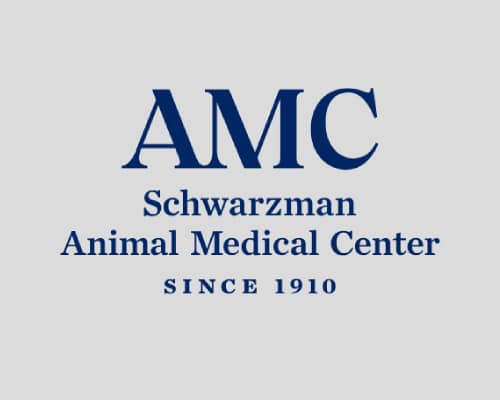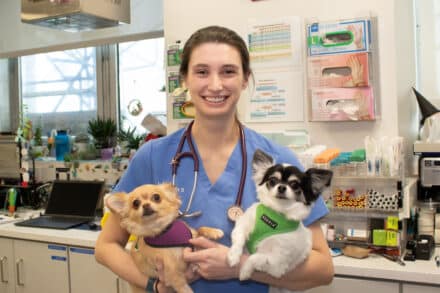Ophthalmology
About Ophthalmology at AMC
The Ophthalmology Service at the Schwarzman Animal Medical Center provides scheduled and emergency care for companion animals with eye and vision problems. Under the direction of a renowned, board-certified ophthalmologist, we offer diagnostic and treatment techniques to alleviate vision disorders in companion animals, ensuring the highest possible quality of life.
We are especially proud of the charitable care we provide to maintain and improve companion animals’ quality of life, including free eye exams for guide dogs, free eye exams for service and working dogs during the month of May as part of the the annual ACVO service animal eye exam event, and subsidized care for rescue animals whose health is an obstacle for their adoption.
Symptoms
If your pet is displaying any of the following symptoms, it may indicate an ocular condition:
- Squinting or holding eye(s) shut
- Scratching or rubbing at eye(s)
- Excessive green or yellow discharge
- Swelling of the eye(s) or eyelid(s)
- A change in color, especially cloudiness or redness
Common clinical signs associated with vision impairment or loss that may require intervention include:
- Running into unfamiliar objects
- Difficulty finding familiar objects (i.e. food dishes, water bowls, toys)
- Lethargy, confusion, weakness, anxiety, depression
- Suddenly unwilling to jump or climb
- Unable to locate moving or stationary objects
- Refusal to move in darkness
- Developing aggressive behavior
- Seeking security—“always at your feet”
- Exaggerated “high-stepping” gait
- Head carried low—“constantly sniffs the ground when walking”
Ophthalmic Examination
When your pet visits the Ophthalmology Service at AMC, we begin with thorough ophthalmic examination. This typically includes:
- An assessment of comfort and vision
- Slitlamp biomicroscopy to evaluate the surface of the eye, the iris, and lens
- Indirect ophthalmoscopy to evaluate the back of the eye (the retina)
- Measurement of tear production and intraocular pressure
Other diagnostic tests may be performed as needed. These can include:
- Gonioscopy
- Electroretinography
- Ocular ultrasound
- CT-scan or MRI
Ophthalmic Procedures
The Ophthalmology team at the Schwarzman Animal Medical Center routinely performs the following procedures for dogs, cats, and other small animals:
- Diamond burr keratotomy to treat an indolent corneal ulcer
- Surgical removal of eyelid tumors
- Surgical correction of entropion
- Surgical correction of a prolapsed gland of the third eyelid
- A conjunctival pedicle graft or other grafting procedure to treat deep corneal ulcers or corneal perforations
- Suturing of corneal lacerations
- Phacofragmentation with artificial lens implantation to treat cataract
- Transscleral lasercyclophotocoagulation to treat glaucoma
- Insertion of an Ahmed glaucoma valve
- Chemical ablation to treat chronic glaucoma
- Removal of the eye
- Insertion of an intrascleral prosthesis
Lecture | Vision Loss in Dogs and Cats
Dr. Alexandra van der Woerdt, Service Head of Ophthalmology, discusses the conditions that can lead to vision loss, how to recognize the signs, and potential treatment options for blinding diseases.
Hosted by the Usdan Institute for Animal Health Education
Our Team

Thomas Hall
LVT






























